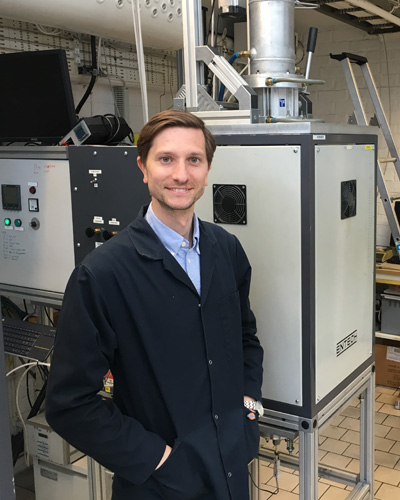Let’s become independent of fossil fuels
Project Manager, Project Management Office, Group Technology, Stockholm
I started working for SSAB on September 1, 2018, having defended my doctoral thesis in Process Metallurgy at KTH Royal Institute of Technology. I had already come into contact with SSAB and HYBRIT during my doctoral studentship, when my colleagues and I conducted experiments for them, in which we produced the very first fossil-free HYBRIT iron. Maybe it was this part that SDP leader Löfvén spoke about during the election campaign, as it contained no carbon (although it wasn’t steel either). That very first small piece of iron ended up in a photo in Dagens Industri together with the CEOs Jan Moström, Magnus Hall and Martin Lindqvist. After completing my doctorate I was hired by SSAB’s Group Technology PM Office, which is headed by Per Enockson, to work on SSAB’s transition to a fossil-free production system.
I’m not able to work as much now on hands-on research as I did during my doctoral studies. I am now mainly supporting HYBRIT with project management in the field of fundamental research, trying to answer questions about the production of steel from hydrogen-reduced DRI. This fundamental research is being done by doctoral students at KTH and Luleå University of Technology (LTU), and it’s really exciting to be part of it. We have already seen that hydrogen-reduced DRI is very pure. Levels of both phosphorus and sulfur, for example, are much lower in this product than in the crude iron currently produced by the blast furnaces. It’s now a matter of finding out how we can use its full potential. What do the biocoal and slag processes need to be like if we are to avoid making the steel dirty rather than purifying it?
I am also working together with my colleague in Luleå, Mikael Lindvall, to plan pilot trials in the electric arc furnace that belongs to SWERIM (formerly Swerea MEFOS). Among other things, we will be testing different biocoals, smelting properties in different hydrogen-reduced DRIs and different slag processes. An electric arc furnace brings many challenges, including how to avoid sulfur absorption. Linking up the fundamental research being done by the doctoral students with the pilot experiments in Luleå is an important element in creating a better understanding of the new steel production process, and which direction it should take.
It feels incredibly good to be part of this journey towards a more sustainable SSAB. The energy and engagement you encounter every day give you a real energy boost, which I hope to be able to draw on for a long time to come!
Johan Martinsson, Project Manager, SSAB, Stockholm.
March 15, 2019
